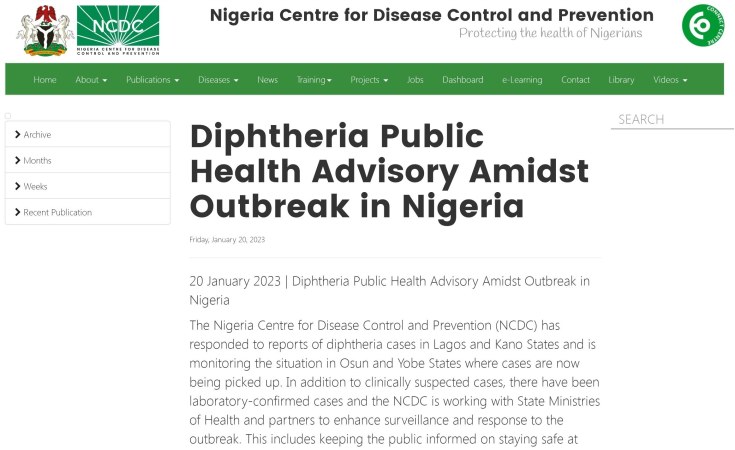NCDC listed symptoms of diphtheria to include fever, runny nose, sore throat, cough, red eyes (conjunctivitis) and neck swelling.
Nigeria on Friday confirmed the outbreak of a new infection of the nose and throat, otherwise known as Diphtheria.
The Nigeria Centre for Disease Control and Prevention (NCDC) in a public health advisory issued Friday morning, confirmed that not less than 25 people have reportedly died from the disease in Kano State, North-West Nigeria.
The disease control centre, however, noted that it has responded to "reports of diphtheria cases in Lagos and Kano States and is monitoring the situation in Osun and Yobe States where cases are now being picked up".
While the NCDC is yet to give data on the number of infections and deaths recorded in the country, the Kano State Commissioner for Health, Aminu Tsanyawa, had on Thursday confirmed that the outbreak of Diphtheria has killed no fewer than 25 persons in the state.
The commissioner told an online newspaper that the state rapid response team has been reactivated and indexed an action plan to check the spread of the deadly disease in the state.
However, NCDC said it's now working with state health ministries and partners to enhance surveillance and response to the outbreak.
About Diphtheria
The NCDC explained that diphtheria is a serious bacterial infection caused by the bacterium called Corynebacterium species that affects the nose, throat and sometimes, the skin of an individual.
It noted that people most at risk of contracting diphtheria are children and adults who have not received any or a single dose of the pentavalent vaccine (a diphtheria toxoid-containing vaccine), people who live in a crowded environment, in areas with poor sanitation and healthcare workers who are exposed to suspected or confirmed cases of diphtheria.
On transmission, NCDC added that the disease spreads easily between people through direct contact with infected people, droplets from coughing or sneezing and contact with contaminated clothing and objects.
The symptoms of diphtheria include fever, runny nose, sore throat, cough, red eyes (conjunctivitis) and neck swelling. In severe cases, NCDC said that a thick grey or white patch appears on the tonsils and/or at the back of the throat associated with difficulty breathing.
Prevention
As regards the prevention of the disease, the NCDC urged parents to ensure that their children are fully vaccinated against diphtheria with three doses of the pentavalent vaccine as recommended in the childhood immunisation schedule.
It added that healthcare workers should be vigilant and look out for symptoms of diphtheria, and individuals with signs and symptoms suggestive of diphtheria should isolate themselves and notify the local government area, state disease surveillance officer or the NCDC through its toll-free line (6232).
It also advised that "close contacts with a confirmed case of diphtheria should be closely monitored, given antibiotics prophylaxis and started on diphtheria antitoxin treatment when indicated, while all healthcare workers with higher exposure to cases should be vaccinated against diphtheria."


